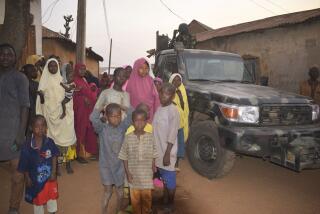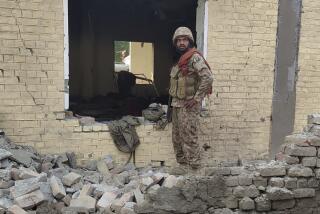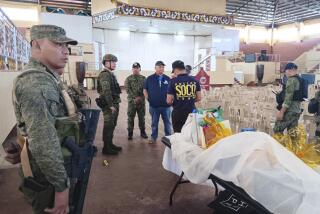Dozens killed in twin blasts in Nigeria
Twin blasts in the northern Nigerian city of Kaduna on Wednesday, both reportedly assassination attempts against prominent figures, killed at least 82 people.
No one claimed responsibility for the blasts, but the first attack targeted the convoy of a cleric who has often criticized the Nigerian militant group Boko Haram.
The attack on Sheik Dahiru Bauchi, who is seen as a moderate, struck about 12.30 p.m., killing at least 32 people, according to police officials. It was the second assassination attempt against Bauchi, following a similar blast near his house in June.
Bauchi reportedly survived the blast. He was said to have been traveling in an open vehicle along a busy thoroughfare, waving at well-wishers, when the blast went off.
Details from the scene were sketchy, but Police Chief Umar Shehu told local media that it was a suicide attack.
Shortly afterward, a second blast in a busy part of Kaduna killed about 50 people. It was apparently aimed at opposition politician Muhammadu Buhari, a former military leader who was a runner-up in the 2011 elections, according to his son, Musa, who spoke to Reuters from the scene.
Buhari, a member of the All Progressive Congress party, escaped without harm, he said.
Kaduna’s governor, Mukhtar Ramalan Yero, declared a curfew after the attacks. In May, Yero banned motorcycle taxis in an effort to improve security in Kaduna and prevent drive-by shootings.
“Enemies of peace have visited us with their ungodly venom of wanton destruction of human lives,” the governor said, according to a Nigerian newspaper, the Premium Times. “This blast, coming in the holy month of Ramadan, is a clear indication that those behind the act have no iota of fear of God as they have none for the sanctity of human life.
“Those behind these attacks have no regards for whatever diversity, as their victims cut across all ethnic and religious divides. It is a responsibility on all of us to unite against this common enemy,” he said.
Boko Haram has often targeted Islamic clerics critical of its operations. In May the emir of Gwoza, Shehu Mustapha Idris Timta, was assassinated in northeastern Nigeria, in a region where many villages have been under attack.
Gunmen also tried to assassinate a prominent religious leader, the Emir of Kano, Ado Bayero, in January.
Nigeria’s military is poorly equipped and suffers low morale despite a budget of around $6 billion, much of which is skimmed off by corrupt officials, according to analysts. Nigerian President Goodluck Jonathan recently tried to get permission from lawmakers to borrow another $1 billion for equipment, but was snubbed.
Boko Haram, seeking to establish an Islamic state in the nation of 170 million, has been setting off bomb attacks in busy urban areas like markets and bus stations, and military-style attacks in rural villages and towns, gunning down civilians, driving people from their homes and raising its flag.
Human Rights Watch has reported that more than 2,000 people have been killed by Boko Haram since the beginning of the year.
Wednesday’s attack came days after Islamist insurgents took control of the town of Damboa in the northeast of the country, killing at least 100 people and displacing 15,000.
There were reports Wednesday that the group had blown up a strategic bridge in northeastern Nigeria.
Follow @RobynDixon_LAT on Twitter for news from Africa.
More to Read
Start your day right
Sign up for Essential California for news, features and recommendations from the L.A. Times and beyond in your inbox six days a week.
You may occasionally receive promotional content from the Los Angeles Times.






